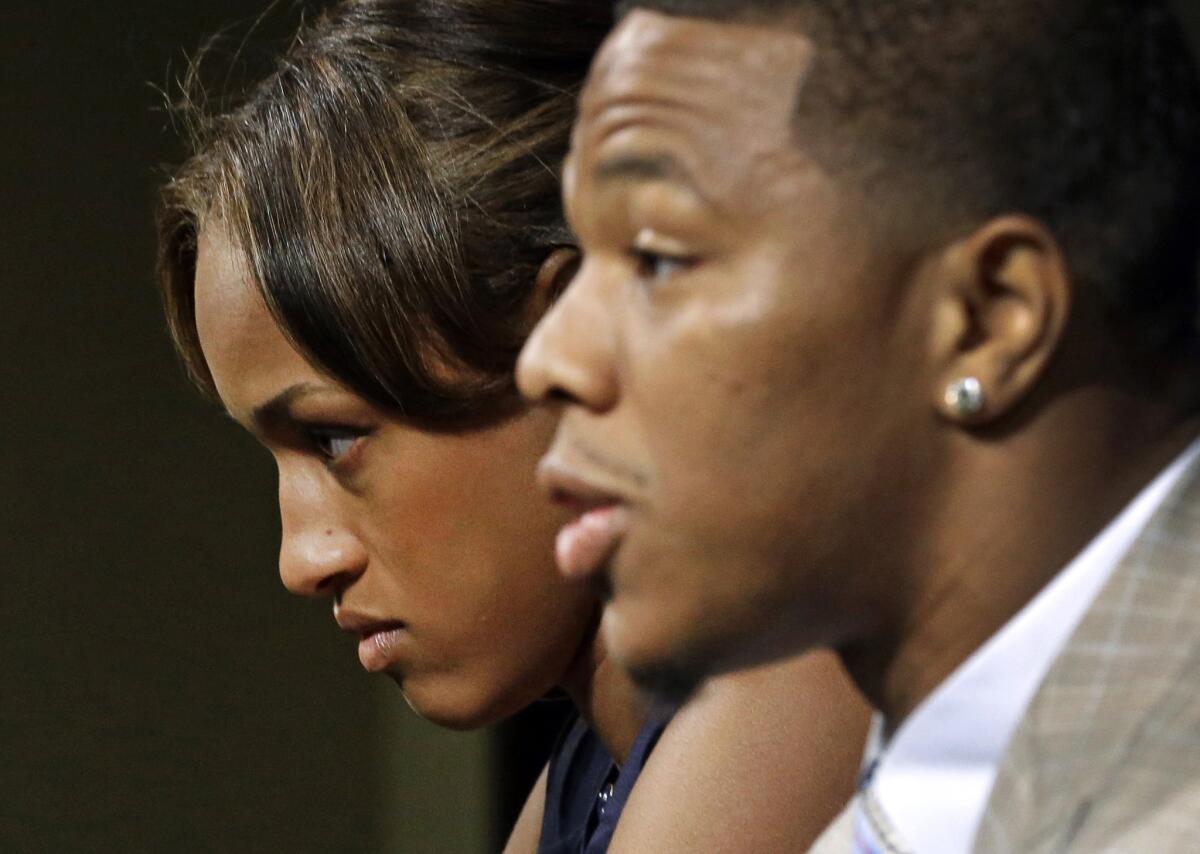Domestic violence: Would it kill Roger Goodell to say ‘I was wrong’?

One hates to be the proverbial skunk at the garden party, but NFL Commissioner Roger Goodell hardly deserves to be lionized in the wake of his decision to tighten up the league’s rules about players who beat their wives.
The man’s values are so out of kilter that it took weeks of relentless public outrage to get him to stop defending his paltry punishment of Ray Rice, the Baltimore Ravens running back who was suspended for two games without pay after an altercation with his soon-to-be-wife in an Atlantic City casino elevator in February.
A widely viewed video shows Rice dragging a stone cold unconscious woman out of an elevator, trying to lift her, then dropping her like a sack of potatoes onto the floor. After about 40 seconds, she struggles to come to, as he walks away from her.
TMZ, which posted the video, called it a “mutual attack.” I don’t care what the victim, Janay Rice, told police, or the NFL. You watch that video and tell me if you think what happened is the result of a “mutual attack.” Even Rice, who was initially charged with felony assault, called his behavior “totally inexcusable.”
Many have noted that Goodell’s reversal is unusual, if not unprecedented.
“The N.F.L. never admits it makes a mistake,” wrote the New York Times’ William C. Rhoden. “Never. Not in labor negotiations when it locks out players, not in the face of abysmal performances by officials and not when it gives a star running back a love tap after evidence that he brutalized his fiancée.”
Well, then, congratulations to Goodell, I guess.
“I feel like the commissioner is on the right path,” Los Angeles domestic violence prevention advocate Patti Giggans told my colleague Sam Farmer. But she also pointed out that it’s been 20 years since O.J. Simpson sparked a painful national discussion about domestic violence and celebrities, and still so little has changed. “Fans can be very forgiving when it comes to sports heroes,” Giggans said.
In his letter to NFL owners, Goodell explained his change of heart:
“My disciplinary decision led the public to question our sincerity, our commitment, and whether we understood the toll that domestic violence inflicts on so many families. I take responsibility both for the decision and for ensuring that our actions in the future properly reflect our values. I didn’t get it right. Simply put, we have to do better. And we will.”
Would it kill the man to say “I was wrong”?
Or, “I apologize to all the domestic violence victims out there who were devastated because I treated marijuana use as a more serious offense than assault”?
On the plus side, his letter is an unequivocal condemnation of domestic violence. He vowed to instill a culture of respect for women both in and out of the workplace, to work with “nationally recognized experts” to develop a model policy on domestic violence and sexual assault, and to increase sanctions on those who violate the policies.
(Is it too much to hope that this newfound “respect” might extend to NFL cheerleaders, who work so hard and are paid so poorly?)
As to the new, harsher sanctions for NFL personnel who hurt their loved ones, Goodell wrote that incidents involving “physical force” will result in a minimum suspension of six games without pay. More severe punishment would be meted out to those who had previous incidents of violence, those with weapons, those who choke or repeatedly strike a victim, those whose offense is “committed against a pregnant woman or in the presence of a child.”
Second offenses will result in “banishment from the NFL” though offenders will be able to petition for reinstatement after one year.
As the league tries to move on from this debacle, we should not forget the misconceptions and rationalizations that allowed Goodell to arrive at his original, now-discredited decision to suspend Rice without pay for only two games.
According to Peter King of Sports Illustrated, here were the “mitigating factors” that Goodell took into account:
Rice had never violated any NFL policy before and quickly admitted his “mistake.” Janay Rice made a “moving and apparently convincing case” that her husband had never hit her before. Janay Rice “urged Goodell not to ruin Rice’s image and career” with sanctions. Charges against Rice were dropped after he entered a “pre-trial counseling program.” Finally, Rice is an avid community volunteer who was leading a Maryland antibullying campaign.
Frankly, I think a domestic abuser who counsels others not to bully is a hypocrite, not a hero.
But more important, Janay Rice’s feelings should have no bearing on her husband’s punishment. None.
A woman who is abused by her mate should never be allowed to have a hand in deciding his punishment. She has the ultimate conflict of interest. She wants to protect the man she loves. If he is the family breadwinner, she will not want to jeopardize her family’s financial wherewithal or deprive their kids of a father’s presence. She will not want to be “responsible” for tarnishing his reputation.
Unfortunately, all that is irrelevant.
Society has an interest in punishing people who brutalize others. We have an interest in deterring the behavior, and in helping make sure others get the message that violence is never an appropriate way to solve a domestic dispute. That’s the calculation an abuser must consider before taking his first swing at the woman he loves. Especially if he holds himself out as a sports hero.
Why did it take Roger Goodell so long to figure that out?
Twitter: @robinabcarian
More to Read
Sign up for Essential California
The most important California stories and recommendations in your inbox every morning.
You may occasionally receive promotional content from the Los Angeles Times.











